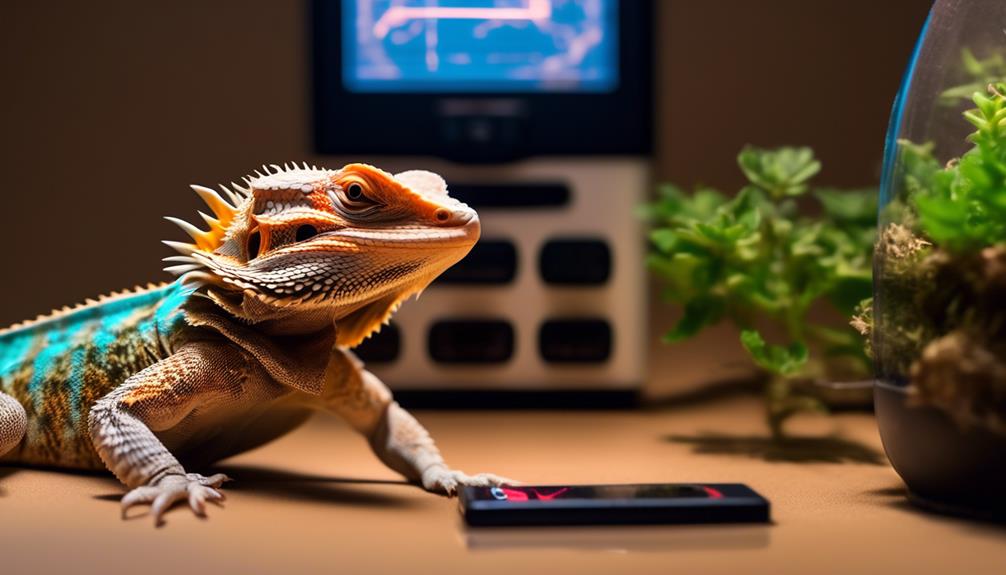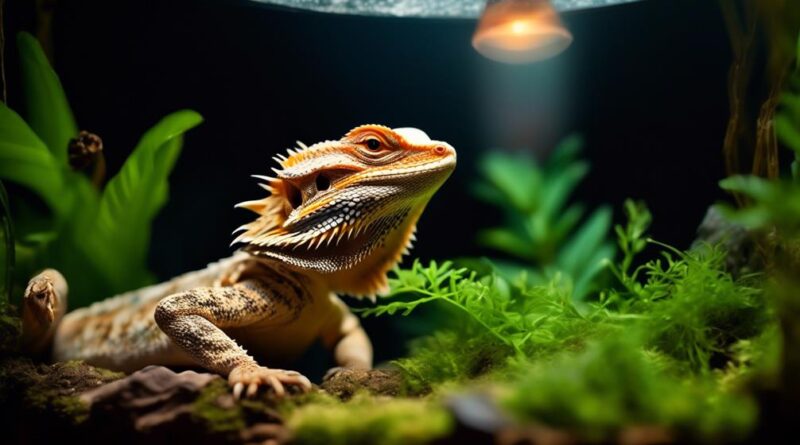Why UVB Lighting Is Crucial for Bearded Dragon Terrarium
Have you ever wondered why UVB lighting is absolutely crucial for your bearded dragon's terrarium? Understanding the importance of this specific type of lighting is not only essential for the overall health and well-being of your pet, but it also plays a significant role in their ability to thrive in captivity.
Without the proper UVB lighting, your bearded dragon can suffer from serious health issues that may not be immediately apparent. But fear not, because by the end of this discussion, you'll have a comprehensive understanding of why UVB lighting is a non-negotiable aspect of creating a suitable habitat for your beloved reptile.
Importance of UVB Lighting
To ensure the health and well-being of your bearded dragon, proper UVB lighting is essential. UVB lighting provides several health benefits for your pet, including aiding in the synthesis of vitamin D3, which is crucial for calcium metabolism. Without adequate UVB exposure, bearded dragons are at risk of developing metabolic bone disease, a condition that weakens their bones and can be fatal. The UVB light also helps in regulating their appetite, activity levels, and overall mood.
In their natural habitat, bearded dragons bask in the sunlight, and UVB lighting in captivity simulates this natural sunlight, providing the necessary light spectrum for their physiological well-being.
Understanding UVB for Bearded Dragons
Understanding UVB lighting is crucial for the optimal health and well-being of your bearded dragon. As a responsible pet owner, it's important to comprehend the significance of UVB in maintaining your reptile's health. Here are a few key points to help you understand UVB for bearded dragons:
- UVB Spectrum: Bearded dragons require UVB light to synthesize vitamin D3, which is essential for calcium metabolism. UVB light allows them to metabolize calcium effectively, preventing health issues such as metabolic bone disease.
- Reptile Health: Without adequate exposure to UVB light, bearded dragons can suffer from a range of health problems, including stunted growth, weakened immune system, and brittle bones. Understanding the role of UVB in reptile health is crucial for providing proper care.
- Natural Sunlight: While artificial UVB lighting is necessary for indoor enclosures, natural sunlight is also beneficial for bearded dragons. Allowing your pet to bask in natural sunlight provides a full spectrum of UVB rays, promoting overall well-being.
- Dietary Supplements: In addition to UVB lighting, it's important to supplement your bearded dragon's diet with calcium and vitamin D3. These supplements can help compensate for any potential deficiencies in their diet or UVB exposure.
Factors to Consider When Choosing UVB Lighting
When choosing UVB lighting for your bearded dragon terrarium, it's essential to consider factors such as the appropriate UVB output and the size of the enclosure.
The first factor to consider is choosing the appropriate spectrum of UVB lighting. Bearded dragons require UVB lighting in the 290-320 nanometer range, which is essential for their calcium metabolism and overall health. Look for UVB bulbs specifically designed for reptiles, as these will provide the necessary spectrum for your bearded dragon.
Another crucial factor to consider is the proper distance from the basking spot. UVB bulbs should be placed within 12-18 inches of your bearded dragon's basking area to ensure they receive an adequate amount of UVB rays. Be sure to regularly check the manufacturer's guidelines for the specific bulb you choose, as different brands may have variations in recommended distances.
Additionally, when selecting UVB lighting, take the size of the terrarium into account. Larger enclosures will require higher output UVB bulbs or multiple UVB sources to ensure that the entire space receives adequate UVB exposure. Conversely, smaller enclosures may only need a single UVB bulb with lower output. Consider the dimensions of the terrarium and the specific UVB requirements of bearded dragons when making your selection.
Best UVB Lighting Types for Bearded Dragons
Considering the factors of appropriate UVB output and terrarium size, the best UVB lighting types for your bearded dragon terrarium are compact fluorescent bulbs, mercury vapor bulbs, and linear fluorescent tubes.
When choosing the best UVB lighting for your bearded dragon, it's important to consider the UVB light spectrum and your bearded dragon's basking habits. Here are the top three options for UVB lighting:
- Compact Fluorescent Bulbs: These bulbs are ideal for smaller terrariums and emit a concentrated UVB light spectrum. They're energy-efficient and provide a good source of UVB for your bearded dragon's basking needs.
- Mercury Vapor Bulbs: Known for their high UVB output, mercury vapor bulbs are suitable for larger terrariums. They also produce UVA and heat, mimicking the natural sunlight that bearded dragons require for basking.
- Linear Fluorescent Tubes: These tubes are excellent for larger terrariums and provide a widespread UVB output. They're a cost-effective option and can cover a larger area, ensuring that your bearded dragon has access to UVB throughout the terrarium.
Understanding your bearded dragon's basking habits is crucial when selecting the appropriate UVB lighting. Bearded dragons require UVB light to support calcium absorption and overall health, and ensuring that they have access to the right UVB spectrum based on their terrarium size is essential for their well-being.
UVB Lighting Placement in the Terrarium
To ensure proper UVB exposure for your bearded dragon, place the UVB lighting in the terrarium at a height that allows the reptile to bask within the recommended distance from the light source. Proper placement of the UVB lighting is crucial for your bearded dragon's health and well-being.
Here are some placement tips to ensure optimal UVB exposure for your pet.
First, position the UVB light fixture above the basking spot within the terrarium. The basking spot should be the warmest area in the enclosure and where your bearded dragon spends a significant amount of its time. By situating the UVB light directly over this area, you can ensure that your pet receives sufficient UVB exposure while basking.
Next, consider the distance between the UVB light and the basking spot. It's essential to follow the manufacturer's guidelines regarding the recommended distance for the specific UVB bulb you're using. Typically, the distance will range from 12 to 18 inches, but this can vary depending on the UVB output of the bulb. Be sure to check the instructions provided with your UVB lighting to determine the appropriate distance for optimal UVB exposure.
Additionally, make sure that there are no barriers, such as screens or glass, between the UVB light and your bearded dragon. These barriers can filter out the UVB rays, reducing their effectiveness and potentially leading to inadequate UVB exposure for your pet.
UVB Lighting Maintenance and Replacement
Regularly check the UVB bulb's expiration date and replace it as needed to ensure your bearded dragon continues to receive adequate UVB exposure. UVB lighting is essential for the health and well-being of your bearded dragon, and proper maintenance of the UVB bulbs is crucial in providing the necessary light spectrum for their growth and development.
Here are some key points to keep in mind for UVB lighting maintenance and replacement:
- UVB Lighting Lifespan: Different UVB bulb brands have varying lifespans, typically ranging from 6 to 12 months. It's important to follow the manufacturer's recommendations and replace the UVB bulb accordingly to ensure your bearded dragon is receiving the appropriate UVB levels.
- Regular Inspection: Make it a habit to routinely check the UVB bulb for any signs of dimming or discoloration. Diminished UVB output can negatively impact your bearded dragon's health, so be proactive in monitoring the bulb's performance.
- Replacement Schedule: Create a schedule for replacing the UVB bulb based on its lifespan and performance. Keeping track of when the bulb was first installed can help you stay on top of replacements, ensuring consistent UVB exposure for your pet.
- Quality UVB Bulbs: Invest in reputable UVB bulb brands known for their reliability and effectiveness. High-quality UVB bulbs may have a longer lifespan and provide more consistent UVB output, benefiting your bearded dragon's overall health.
Monitoring UVB Levels in the Terrarium

To monitor the UVB levels in your bearded dragon terrarium, use a UVB meter to regularly assess the output and effectiveness of the lighting. UVB light meters are essential tools for ensuring that your bearded dragon is receiving the appropriate levels of UVB radiation necessary for their health and well-being. These meters measure the intensity of UVB radiation in the terrarium, allowing you to make informed decisions about the positioning and replacement of UVB bulbs.
Measuring the effectiveness of UVB lighting is crucial for the overall health of your bearded dragon. UVB meters provide accurate readings, enabling you to determine if the UVB output is within the recommended range for bearded dragons. This is important as insufficient UVB exposure can lead to metabolic bone disease and other health issues, while excessive exposure can cause skin and eye problems.
UVB Lighting Tips for Bearded Dragon Health
You can optimize the UVB lighting in your bearded dragon terrarium by implementing a few key tips that ensure the health and well-being of your pet.
- Positioning: Place the UVB light at the appropriate distance from your bearded dragon's basking spot. This should typically be around 10-12 inches away to provide adequate UVB exposure without causing harm. Use a digital UV meter to measure the levels and ensure they fall within the recommended range of 100-150 microwatts per square centimeter.
- Lighting Schedule: Mimic the natural day-night cycle by providing 10-12 hours of UVB light each day. This helps regulate your bearded dragon's internal clock and encourages natural behaviors.
- Quality Bulbs: Invest in high-quality UVB bulbs specifically designed for reptiles. These bulbs emit the necessary UVB wavelengths essential for synthesizing vitamin D3, which is crucial for your bearded dragon's overall health.
- Supplement with Calcium and Vitamin D3: While UVB lighting aids in the production of vitamin D3, it's also important to dust your bearded dragon's food with calcium and vitamin D3 supplements. This supports bone health, especially if your pet doesn't receive enough UVB exposure or has a limited diet.
Frequently Asked Questions
Can I Use Regular Household Light Bulbs Instead of UVB Lighting for My Bearded Dragon?
You can't use regular household light bulbs for your bearded dragon. They don't provide UVB necessary for their health. Natural sunlight is best, but if not available, use specific UVB fluorescent tubes or vitamin supplements as alternatives.
What Are the Potential Health Risks for My Bearded Dragon if They Don't Receive Enough UVB Lighting?
Without proper UVB lighting, your bearded dragon may suffer from vitamin deficiencies, leading to serious health issues like metabolic bone disease. Without adequate sunlight exposure, they can't produce essential vitamins, impacting their overall well-being.
Can I Use the Same UVB Lighting for Both My Bearded Dragon's Basking and Overall Terrarium Lighting?
Yes, you can use the same UVB lighting for both your bearded dragon's basking and overall terrarium lighting. Ensure the UVB lighting temperature is appropriate and place it in a way that covers the entire terrarium.
How Often Should I Replace the UVB Bulbs in My Bearded Dragon's Terrarium?
You should replace UVB bulbs every 6-12 months. Quality brands like Zoo Med and Reptisun provide a lifespan guarantee. Regularly replacing bulbs ensures your bearded dragon receives proper UVB exposure, crucial for their health.
Are There Any Alternative Methods for Providing UVB Exposure to My Bearded Dragon if I Can't Use Traditional UVB Lighting?
If you can't use traditional UVB lighting, consider using reflective surfaces to optimize natural sunlight exposure for your bearded dragon. Place mirrors or aluminum foil around the terrarium to help direct and enhance UVB rays.
Conclusion
Make sure to prioritize UVB lighting for your bearded dragon's terrarium. It's crucial for their health and well-being, as it helps them produce vitamin D3 and absorb calcium.
Choose the right type of UVB lighting, place it correctly in the terrarium, and monitor its levels regularly.
With proper UVB lighting, you can ensure that your bearded dragon stays healthy and happy in their environment.
